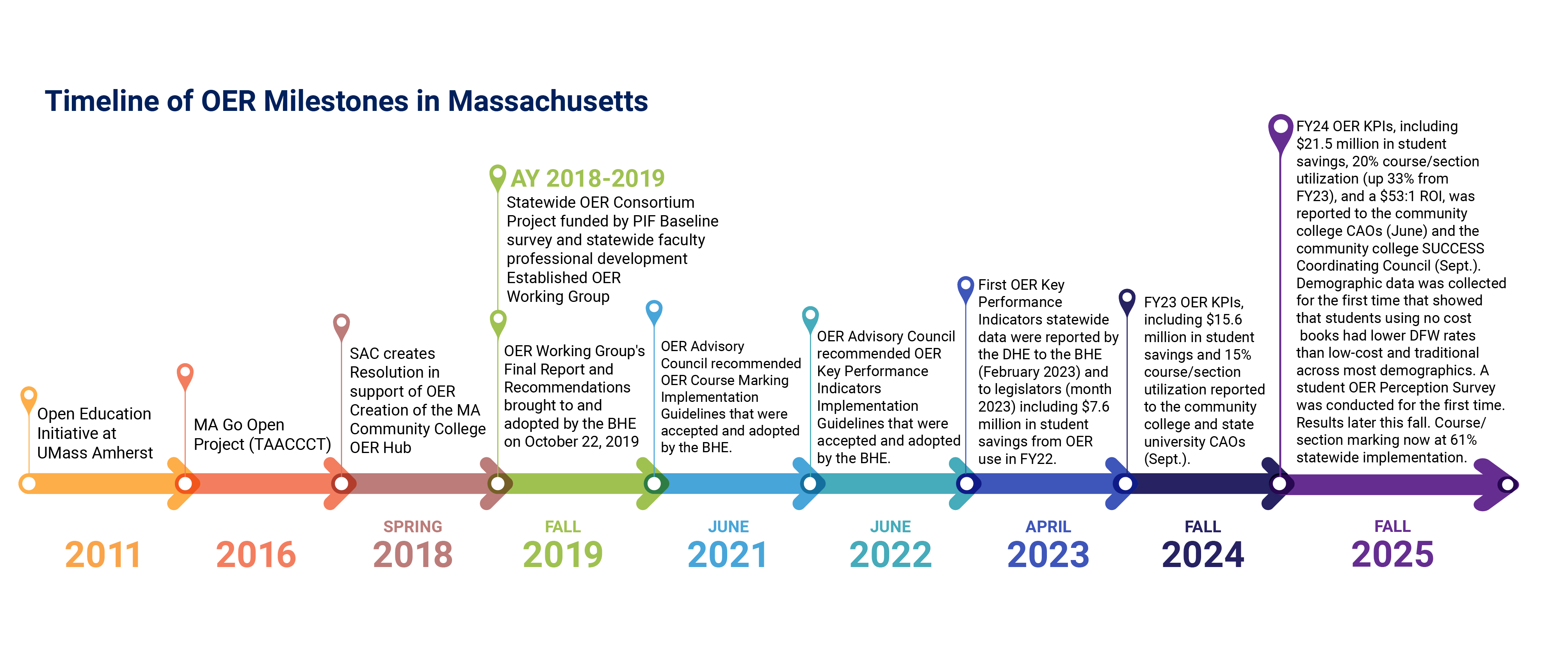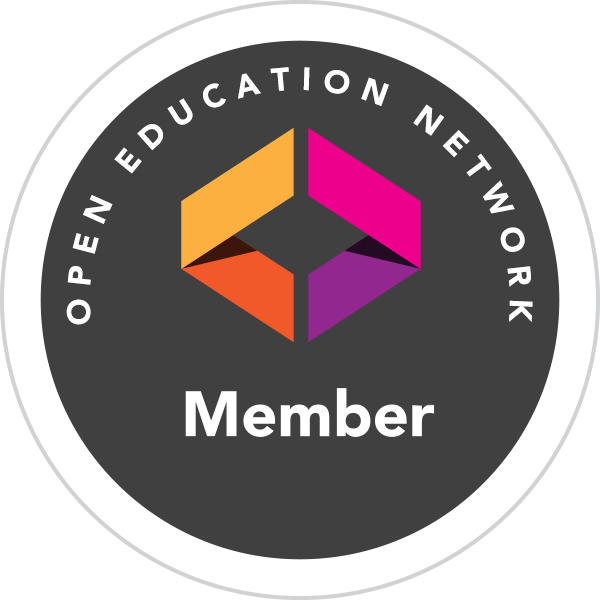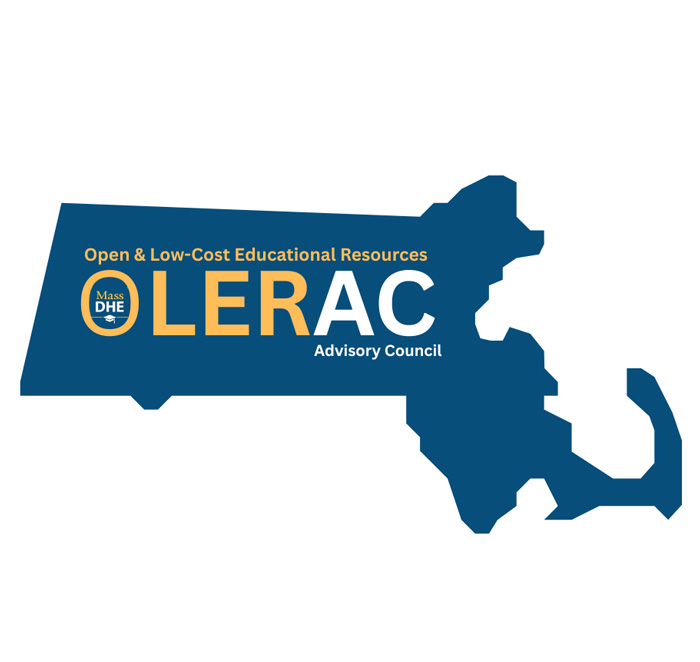
Strategic Initiatives
The Open Educational Resources (OER) initiative grew out of recommendations from the Commissioner’s OER Work Group and aims to expand OER use on campuses and provide advice and counsel to the DHE for statewide implementation.
Robert J. Awkward, Ph.D.,
Assistant Commissioner for Academic Effectiveness
(617) 994-6908
rawkward@dhe.mass.edu
2018 – Present
OER Training Registration Form
Open Textbook Library
MA is an OER Exemplar (NEJHE)
Inside the Collaborative Effort in MA to Advance OER (SPARC)
Multiple Campuses
Open Educational Resources (OER) are teaching, learning and research materials in any medium—digital or otherwise—that reside in the public domain or have been released under an open license that permits no-cost access, use, adaptation and redistribution by others with no or limited restrictions.
These freely accessible text, media, and other digital assets are useful for teaching, learning, and assessing as well as for research purposes—this collaboration offers direct benefits to faculty and students at the 29 public higher education institutions in the Commonwealth.
In 2018–2019, UMass Amherst, Worcester State University, Holyoke Community College, and Northern Essex Community College led a collaborative project called “Massachusetts Open Education: Achieving Access for All,” funded by a Higher Education Innovation Fund grant. The project helped build OER capacity across the state and assessed the OER landscape at all public higher education institutions in Massachusetts. By gathering and analyzing data about current OER usage from each college to determine regional training needs, we were able to assist the project in achieving its goal of lowering overall costs for students, increasing student and faculty engagement, and ultimately improving college completion rates.
On October 22, 2019, the Board of Higher Education accepted the Final OER Report & Recommendations, Fall 2019 from the Commissioner’s OER Work Group and endorsed implementation of its recommendations, which are time-based (short-term, mid-term, and long-term), to address:
This effort was accomplished due to the strong and consistent advocacy of the Student Advisory Council.

The development and use of OER can create more equitable learning experiences for all students. In addition, OER closes equity gaps because it provides students who cannot afford required course materials access to the resources they need. Moreover, several studies affirm that OER use also improves student success outcomes.
The Center for Teaching and Learning (CTL) at the University of Georgia (UGA) began to encourage the use of OER in the summer of 2013. A study of faculty who taught large enrollment courses and were currently using an expensive textbook or textbook/technology package was conducted. For the more than 21,000 students involved in this study, not only did they enjoy significant savings using work mostly created by OpenStax, but there was also a positive impact on their learning. The study at the University of Georgia also showed a significant and positive impact on under-represented students:
When considering Federal Pell eligibility, we observed an increase in A through B+ letter grades and a decrease in B though DFW grades. A significant decrease in DFW rates for Pell-eligible students was found (a 4.43 percent change) when OER was adopted as the textbook for the class. This research [also] revealed significant differences in academic performance (average final grade) for both White and non-White students enrolled in OER courses. However, the magnitude in which non-White students’ grades improved is very compelling (Colvard, Watson, & Park, 2018, p. 272.)
These types of findings were echoed in the Achieving the Dream community college study where 48 percent of Pell Grant recipients and 52 percent of under-represented minorities said OER courses had a significant impact on their ability to afford college compared to 41 percent for other students (Ashford, 2018). When students have access to course learning materials, it positively affects their in-class performance leading to student success, persistence, and completion.
The results from the 2018 study were echoed again in the 2020 Achieving the Dream study conducted by their partners SRI Education and rpk GROUP (2020). This study involved eleven community colleges across the country. The average age of the study participants was 20. At least a third or more of the participating students were eligible for or had received a Pell grant. The proportion of students from historically under-represented ethnic minority groups ranged from 25 percent to 88 percent. “In 6 of the 11 colleges, treatment students1 taking OER courses accumulated significantly more course credits than those who had not taken any OER courses” (SRI International, 2020, p. 20). While the study did not find a significant impact on GPA by students taking OER courses, students maintained their GPAs despite taking more courses. Finally, “the number of credits earned by Pell students taking OER courses relative to their Pell-eligible peers was significantly higher than the number of credits earned by non-Pell-eligible students taking OER courses relative to their non-Pell-eligible peers” (SRI International, 2020, p. 23-24).
Additionally, the benefits for part-time students were equally compelling. Part-time students are often overlooked in higher education, and 71 percent are self-financing their education (Bombardieri, 2017). This population contains many of our under-represented students and tends to be concentrated at community colleges. The UGA study found a 53.12 percent increase in average course grades and a 29.54 percent decrease in DFW rates for part-time students (Colvard, Watson, & Park, 2018).

The Massachusetts Department of Higher Education joined the Open Education Network (OEN), a consortium of colleges and universities working to advance open textbook initiatives. OEN supports the Open Textbook Library, a searchable online catalog of complete textbooks available for faculty and students to freely use, adapt, and distribute to best meet the needs of their courses.
One of the benefits of OEN membership is that the DHE, in conjunction with OEN, will coordinate full-day “train-the-trainer” workshops that will be offered to OLER Advisory Council members and their respective institutional OER faculty.
There was one Faculty OER training session held on May 21.
This workshop focused on:
Details about the faculty OER training may be found here.
Faculty who attend an institutional training event will have the opportunity to review an open textbook and receive a $200 stipend. Faculty will have five to six weeks to complete the open textbook review. Details to be provided.
Faculty OER 101 Training from May 21, 2025:
Other benefits include attendance at the OEN Summer Institute for statewide OER leaders, participation in their Google group, access to their Open Textbook Library, discounted institutional membership, and their data dashboard. We are excited about this continuing partnership for all our public institutions.

The OER Work Group was co-chaired by Marilyn Billings, Head, Scholarly Communications, University of Massachusetts Amherst and Susan Tashjian, Coordinator of Instructional Technology, Northern Essex Community College, who led a team of 21 individuals—comprised of librarians, faculty, administrators, students, and external representatives—from the UMass System, state universities, and community colleges. Their work resulted in a Final OER Report & Recommendations. Among those ten recommendations was the creation of a statewide OER Advisory Council and an OER Statewide Coordinator.
As a result of the October 2019 BHE vote, Dr. Robert J. Awkward from the DHE was designated the OER Statewide Coordinator and the Statewide OLER Advisory Council was convened, consisting of one representative from each of the 29 public institutions. The advisory council serves to expand OER use on campuses and to provide advice and counsel for OER implementation throughout Massachusetts. The Statewide OLER Advisory Council and the OER Statewide Coordinator will be responsible for implementing the short-term recommendations of the OER Work Group and developing plans, after conducting additional research, for how to implement the mid and long-term recommendations. The OLER Advisory Council is co-chaired by Susan Tashjian, Academic Innovations Program Manager at Northern Essex Community College, and Dr. Kisha Tracy, Professor of English Studies and General Education Chair, Fitchburg State University.
The Open & Low-Cost Educational Resources Advisory Council (OLERAC) supports institutional advocacy and student success efforts to dismantle educational cost barriers, champion equity, and reimagine free and low-cost learning resource models. OLERAC facilitates and encourages compensation and recognition for efforts in contributing to open knowledge creation, scholarship, dissemination, and access.
The following are the members of the Statewide OLER Advisory Council, recommended by their respective chancellor or president to serve to advance OER across the state and within their own campuses.
*Names in bold are from the OER Working Group
| OER Statewide Coordinator | Robert Awkward, Assistant Commissioner for Academic Effectiveness | rawkward@dhe.mass.edu |
|---|---|---|
| DHE Executive Sponsor | Dr. Richard Riccardi, Deputy Commissioner for Academic Affairs & Student Success | rriccardi@dhe.mass.edu |
| Employer Representative | Cherie Comeau, Director, Leadership & Org. Development | ccomeau@consigli.com |
| Ex-Officio | Marilyn Billings, UMass Amherst (retired), Emeritus | Marilyn.billings@comcast.net |
| Ex-Officio | Alex Demou, Director of Constituent & Legislative Affairs | ADemou@dhe.mass.edu |
| Ex-Officio | Nicole Johnson, Director of Educational Equity & Justice | nicjohnson@dhe.mass.edu |
| Ex-Officio | Christine Moynihan, Scholarly Communications, Data & Affordable learning Librarian, UMass Boston | christine.moynihan@umb.edu |
| Ex-Officio | Suzanne Smith, Director of Research & Evaluation, DHE | Ssmith2@dhe.mass.edu |
| Ex-Officio | Rachel Oleaga, Open Mass. Public Higher Education Repository Coordinator | roleaga@necc.mass.edu |
| Berkshire Community College | Meghan Callaghan, Dean Teaching & Learning Innovation | mcallaghan@berkshirecc.edu |
|---|---|---|
| Matt Martin, Coordinator of Learning Experience Design | msmartin@berkshirecc.edu | |
| Bristol Community College | Susan Souza-Mort, Research & Instruction Librarian | Susan.Souza-Mort@bristolcc.edu |
| Bunker Hill Community College | John Brittingham, Associate Director, Teaching, Learning & Instructional Design |
John.brittingham@bhcc.edu |
| Ceit De Vitto, AIDE Senior Special Programs Coordinator | kmdevitt@bhcc.edu | |
| Cape Cod Community College | Timothy Gerolami, Director of Library Services | tgerolami@capecod.edu |
| Greenfield Community College | Tim Dolan, Librarian | dolant@gcc.mass.edu |
| Holyoke Community College | Jennifer Adams, Librarian | jadams@hcc.edu |
| MassBay Community College | Bernadette Sibuma, Director of Online Learning | bsibuma@massbay.edu |
| Massasoit Community College | Jesse Schreier, Coordinator of Institutional Technology | jschreier@massasoit.mass.edu |
| Middlesex Community College | Tracy Joyce, Coordinator of Library Services | joycet@middlesex.mass.edu |
| Mount Wachusett Community College | Kim Colangelo, Director of Learning Design & Technology | kcolangelo@mwcc.mass.edu |
| North Shore Community College | Andrea Milligan, Director, Center for Teaching & Learning | amilliga@northshore.edu |
| Northern Essex Community College | Susan Tashjian, Academic Innovations Program Manager and Advisory Council Co-Chair | stashjian@necc.mass.edu |
| Quinsigamond Community College | Brooks Winchell, Executive Director for Distance/Online Learning | bwinchell@qcc.mass.edu |
| Cary Morse, Dean of Library & Academic Support Services | csmorse@qcc.mass.edu | |
| Roxbury Community College | Totsaporn Intarabumrung, Coordinator of Library Services | tintarabumrung@rcc.mass.edu |
| Springfield Techincal Community College | Kat Good-Schiff, Instructional Services & OER Librarian | kmgood-schiff@stcc.edu |
| Bridgewater State University | Cynthia Svoboda, Interim Dean of the Library | csvoboda@bridgew.edu |
|---|---|---|
| Fitchburg State University | Connie Strittmatter, Associate Librarian | cstrittm@fitchburgstate.edu |
| Framingham State University | Rebecca Dowgiert, Scholarly Communications Librarian | rdowgiert@framingham.edu |
| MassArt | Rachel Resnik, Technical Services Librarian | rresnik@massart.edu |
| MCLA | Emily Alling, Associate Dean for Library Services | Emily.Alling@mcla.edu |
| Mass Maritime | Carey Zigouras, Access Services Manager | czigouras@maritime.edu |
| Salem State University | Elizabeth McKeigue, Dean of the Library | elizabeth.mckeigue@salemstate.edu |
| Westfield State University | Corinne Ebbs, Head Education Resources Center | cebbs@westfield.ma.edu |
| Worcester State University | Victoria Gruzynski, Teaching & Learning Librarian | vgruzynski@worcester.edu |
| UMass Amherst | Ryan Clements, Associate Dean for Data, Digital Strategies & Scholarly Communications | rclements@umass.edu |
|---|---|---|
| UMass Boston | Apurva Mehta, Associate Chief Information Officer | Apurva.Mehta@umb.edu |
| Stephanie Walker, Dean of University Libraries | Stephanie.Walker@umb.edu | |
| UMass Dartmouth | Emma Wood, Scholarly Communications Librarian | Emma.wood@umassd.edu |
| UMass Lowell | Donna Mellen, Associate Director of Academic Technology | Donna_Mellen@uml.edu |
| UMass Medical | Sarah Hutton, Education & Clinical Services Librarian | Sarah.Hutton1@umassmed.edu |
| Fitchburg State University | Kisha Tracy, Professor, English Studies & Chair, General Education; OER Advisory Co-Chair | ktracy3@fitchburgstate.edu |
|---|---|---|
| Framingham State University | Patricia Lynne, Professor, English & Chair, General Education | plynne@framingham.edu |
| Amanda Simons, Professor & Chair, Biology | asimons@framingham.edu | |
| Northern Essex Community College | Devan Walton, Associate Professor, Computer Science | dwalton@necc.mass.edu |
| UMass Amherst | Brokk Toggerson, Senior Lecturer, Physics | toggerson@umass.edu |
| UMass System | Vacant | |
|---|---|---|
| State University | Vacant | |
| Community College | Michael Hannigan, Greenfield Community College | hanniganm@stuemail.gcc.mass.edu |
| Student Advisory Council | Niki Nguyen, Chair, UMass Boston | Niki.Nguyen001@umb.edu |
The advisory council generally meets monthly during the academic year (September—May), but may meet more or less frequently as determined by the OER Statewide Coordinator.
February 2026
Download: ![]() Agenda
Agenda
![]() Strategic Planning Committee (SPC) Updates OLER Advisory Council
Strategic Planning Committee (SPC) Updates OLER Advisory Council
![]() 2025 Faculty OER 101 Survey
2025 Faculty OER 101 Survey
December 15, 2025
Download: ![]() Agenda
Agenda
November 24, 2025
Download: ![]() Agenda
Agenda
![]() UMass Analysis of the Open Educational Resources Survey Report
UMass Analysis of the Open Educational Resources Survey Report
October 20, 2025
Download: ![]() Agenda
Agenda
![]() AAC Motion 20-03
AAC Motion 20-03
![]() OLER October Presentation
OLER October Presentation
September 22, 2025
Download: ![]() Agenda
Agenda
![]() OER Advisory Council FY25 Review
OER Advisory Council FY25 Review
![]() Student Experiences with Textbooks - Qualitative Data Presentation
Student Experiences with Textbooks - Qualitative Data Presentation
May 19, 2025
Download: ![]() Agenda
Agenda
![]() OER Key Performance Indicators: FY24
OER Key Performance Indicators: FY24
April 14, 2025
Download: ![]() Agenda
Agenda
February 10, 2025
Download: ![]() Agenda
Agenda
![]() OER Advisory Council Members Memo
OER Advisory Council Members Memo
December 16, 2024
Download: ![]() Agenda
Agenda
November 18, 2024
Download: ![]() Agenda
Agenda
October 21, 2024
Download: ![]() Agenda
Agenda
![]() OER Advisory Council FY24 Review
OER Advisory Council FY24 Review
![]() Strengthening Your Campus Program Presentation
Strengthening Your Campus Program Presentation
May 20, 2024
Download: ![]() Agenda
Agenda
April 8, 2024
Download: ![]() Agenda
Agenda
March 11, 2024
Download: ![]() Agenda
Agenda
February 12, 2024
Download: ![]() Agenda
Agenda
December 18, 2023
Download: ![]() Agenda
Agenda
![]() MASS OER IA Webinar
MASS OER IA Webinar
![]() OER Advisory Council Meeting
OER Advisory Council Meeting
November 13, 2023
Download: ![]() Agenda
Agenda
![]() MASSPIRG OER Efforts Presentation
MASSPIRG OER Efforts Presentation
October 23, 2023
Download: ![]() Agenda
Agenda
![]() OER Advisory Council FY23 Review
OER Advisory Council FY23 Review
![]() ROTEL: Remixing Open Textbooks
through an Equity Lens
ROTEL: Remixing Open Textbooks
through an Equity Lens
June 26, 2023
Download: ![]() Agenda
Agenda
![]() OER KPI Guidance
Meeting Recording Passcode: 6&7umGvT
Faculty OER 101 FY23 Survey
OER KPI Guidance
Meeting Recording Passcode: 6&7umGvT
Faculty OER 101 FY23 Survey
May 22, 2023
Download: ![]() Agenda
Agenda
February 27, 2023
Download: ![]() Agenda
Agenda
December 12, 2022
Download: ![]() Agenda
Agenda
October 24, 2022
Download: ![]() Agenda
Agenda
September 26, 2022
Download: ![]() Agenda
Agenda ![]() OER Inclusive Access Survey
OER Inclusive Access Survey ![]() OER Inclusive Access Survey Presentation
OER Inclusive Access Survey Presentation ![]() OER FY22 Advisory Council Review
OER FY22 Advisory Council Review
May 16, 2022
Download: ![]() Agenda
Agenda
March 21, 2022
Download: ![]() Agenda
Agenda ![]() OER Assessment MA Guide
OER Assessment MA Guide
January 24, 2022
Download: ![]() Agenda
Agenda ![]() OER KPI Guide Present
OER KPI Guide Present ![]() SPARC Inclusive Access
SPARC Inclusive Access
December 20, 2021
Download: ![]() Agenda
Agenda ![]() Hub Coordinator Outcomes
Hub Coordinator Outcomes ![]() OER Best Practices
OER Best Practices
![]() OER Faculty Webinar Survey
OER Faculty Webinar Survey
October 25, 2021
Download: ![]() Agenda
Agenda ![]() DOERS3 Tenure & Promotion Presentation
DOERS3 Tenure & Promotion Presentation
September 20, 2021
Download: ![]() Agenda
Agenda ![]() OER AY2021 in Review Presentation
OER AY2021 in Review Presentation ![]() OER Rotel Presentation
OER Rotel Presentation
June 21, 2021
Download: ![]() Agenda
Agenda
May 17, 2021
Download: ![]() Agenda
Agenda ![]() Fitchburg State University OER Assessment Plan
Fitchburg State University OER Assessment Plan ![]() MA Community College Consortium for OER (CCCOER) Update
MA Community College Consortium for OER (CCCOER) Update
March 8, 2021
Download: ![]() Agenda
Agenda ![]() Presentation
Presentation
January 11, 2021
Download: ![]() Agenda
Agenda ![]() Repository Committee Report
Repository Committee Report
December 14, 2020
Download: ![]() Agenda
Agenda ![]() Presentation
Presentation
November 16, 2020
Download: ![]() Agenda
Agenda ![]() Presentation
Presentation
October 19, 2020
Download: ![]() Agenda
Agenda ![]() Equity Key Performance Indicators
Equity Key Performance Indicators ![]() Proposed Key Performance Indicators
Proposed Key Performance Indicators
September 14, 2020
Download: ![]() Agenda
Agenda ![]() OER Student Ambassador Duties
OER Student Ambassador Duties ![]() UTA Student Satisfaction Survey
UTA Student Satisfaction Survey ![]() Texas Board of Higher Ed Repository Announcement
Texas Board of Higher Ed Repository Announcement ![]() OER Course Flagging Survey Results & Recommendations
OER Course Flagging Survey Results & Recommendations ![]() Equity Key Performance Indicators
Equity Key Performance Indicators
May 12, 2020
Download: ![]() Agenda
Agenda ![]() Group Photo
Group Photo ![]() Upcoming Faculty OER Training Flyer
Upcoming Faculty OER Training Flyer
April 8, 2020
Download: ![]() Agenda
Agenda ![]() New England OER Landscape Presentation
New England OER Landscape Presentation ![]() Student Advisory Council OER Initiative Presentation
Student Advisory Council OER Initiative Presentation
March 04, 2020
Download: ![]() Agenda
Agenda ![]() Kickoff Presentation
Kickoff Presentation ![]() Legislative Update
Legislative Update ![]() OTN Presentation
OTN Presentation